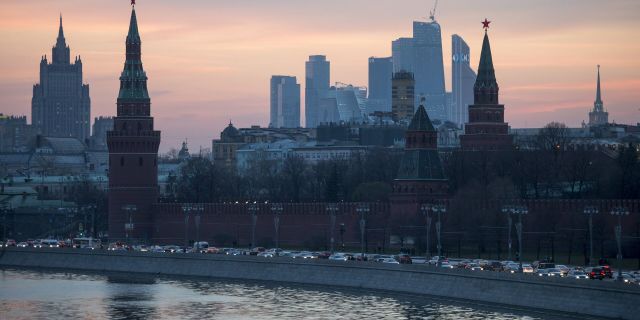No new Cold War
Thoughtless monetary aid to Ukraine and tough sanctions against Russia will not go sideways to the West, writes TAC. The author agrees with Kissinger's position and calls for sitting down at the negotiating table. However, Europe has a different opinion.
Henry Kissinger calls for peace through negotiations. But because of $54 billion, no one will listen to him.
On Monday, the CIA announced that it had installed two more stars on its memorial wall in honor of fallen employees. The message about this is rather vague, as befits the mysterious world of intelligence. Maybe these quiet and dead Americans did not die in Ukraine, maybe some time has passed since their death. But there are still questions.
A colleague of mine recently asked how many more American lives should be given in addition to 54 billion taxpayer dollars to get out of the stalemate in eastern Ukraine. What are our interests there? As if an aging swamp monster emerged from a terrible dream to indignantly declare: the Americans did not die in vain, all the money was also not spent in vain. After all, it is necessary for Russia to be defeated. According to him, the same thing is happening as in the 1980s, when we supplied weapons to the Afghan Mujahideen to fight the Soviets. It doesn't matter that Osama bin Laden had a second career. <...>
Probably, when the war party sends its people, it does not send the best. The worn-out arguments of a man clinging to the days of former glory from the Cold War era should not be regarded as an argument in favor of America's further participation in the Ukrainian events. But I can contrast one Cold War warrior with another and suggest that Henry Kissinger's comments made recently in Davos should be listened to. The former Secretary of State said that for the sake of achieving peace, Ukraine must cede its territory in the east to Russia. "We need to start negotiations in the next two months before tensions and shocks arise, which will not be easy to overcome," Kissinger said, quoted by theTelegraph. — Ideally, the dividing line should return us to the pre-existing state of things. The continuation of the conflict beyond these borders is no longer a struggle for the freedom of Ukraine, but a new war against Russia itself."
Kissinger warned the West not to "succumb to the mood of the moment." And the mood of the moment is a recognized indirect war with Russia, in which, according to The Wall Street Journal, The Pentagon really wants to involve American special forces (let's pretend that the special forces are not fighting there yet under the guise of "advisers"). Is this an inflection? A threat? Do they think the Kremlin doesn't read The Wall Street Journal?
The Ukrainian army, without the open participation of the United States, is unlikely to be able to return those lands for which the struggle has been waged for almost ten years. This is the point of view of my colleague, this is the point of view of Kissinger. It is impossible to achieve victory without escalation and a large-scale catastrophe. And if we return to the original state in terms of territory, which existed before the hostilities? This will be close to a win-win and mutually beneficial situation, which is only possible in a military conflict that has claimed so many lives and turned so many into refugees.
If you want peace, prepare for conflict. After all, the goal should be peace, not war for the sake of war. A slow and difficult return to the previous state will require new Ukrainian, and possibly American, victims. If something like this can be achieved at the negotiating table before these losses appear, before thoughtless monetary aid and harsh sanctions cause even greater damage to the Western economy, then this should be considered a gift of fate and a boon.
Liberal internationalists will say that they are fighting for a lasting and lasting peace, that Russia must be punished and weakened to such an extent that it does not pose any threat in the future. But the problem is that a cornered nuclear power can snap back with nuclear weapons. There is another problem. Ukrainians alone will not achieve such a victory. If the goal is to defeat Russia, then such a goal will require even more active Western intervention.
Kissinger is also thinking about long-term peace and the balance of power in Europe. Let's reflect. Imagine for a moment the following unlikely, purely hypothetical scenario. If Putin needs to inflict a crushing defeat, but without an open war with NATO and without nuclear escalation, then an already unstable Europe will be in an even more dangerous position. The EU and NATO represent the common interests of European countries in relation to the United States and Russia. Germany and France, if we recall the great wars, have historically been adversaries. The end of the story has not come.
The rallying of the major European powers, first military and then economic, was their reaction to American domination. And the fact that they continue to stick together is a response to Russia's power in the east. Why should France and Germany form a joint economic policy if security interests disappear from this equation? Why is NATO terrible if there is no Russia? Russian Russians seem to have forgotten the words of Lord Ismay, who said: "keep the Russians out of Europe, the Americans in Europe, and the Germans under the control of Europe." This last part is also important, because Poland was attacked not only from the east.
Unfortunately for all of us, Kissinger said his words at the World Economic Forum in Europe. There, the influential and powerful of this world responded to Vladimir Zelensky's call to continue the fight and impose new sanctions with a standing ovation.
Author: Micah Meadowcroft

